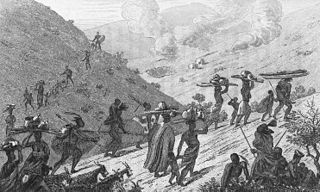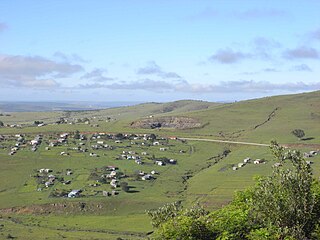Related Research Articles
The Tumbuka language is a Bantu language which is spoken in the Northern Region of Malawi and also in the Lundazi district of Zambia. It is also known as Chitumbuka or Citumbuka — the chi- prefix in front of Tumbuka means "the language of the", and is understood in this case to mean "the language of ". Tumbuka belongs to the same language group as Chewa and Sena.

The Fengu people refers to a variety of ethnic groups that fled from the Mfecane to enter into various Xhosa speaking areas, but now often considered to have assimilated by the Xhosa people whose language they now speak. The term derives from the verb "ukumfenguza" which means to wander about seeking service. Historically they achieved considerable renown for their military ability in the frontier wars.
Chief Justice Thandathu Jongilizwe Mabandla known as Chief Justice Mabandla is the chief of the AmaBhele Tribe in Alice (Tyume). He was born on 16 August 1926 and is the eldest son of the late Simolwna Mabandla

The Xhosa nation are a Bantu ethnic group from Southern Africa whose homeland is primarily within the modern-day Eastern Cape. There is a small but significant Xhosa-speaking (Mfengu) community in Zimbabwe, and their language, isiXhosa, is recognised as a national language.
Kei Rail is a railway project in South Africa.
South Africa's 2011–12 Premier Soccer League season was the sixteenth since its establishment. Orlando Pirates were the defending champions, having won their third PSL title, and in the process ended SuperSport United's 3 year grip on the championship. The season kicked off on 12 August 2011 and ended on 19 May 2012.
The Komo–Bira languages are part of the Bantu languages coded Zone D.20–30 in Guthrie's classification, specifically D.21, D.22, D.23, D.31, D.32. According to Nurse & Philippson (2003), they form a valid node; the rest of D.20 include the Lega–Holoholo languages, while the rest of the D.30 languages are not related to each other, apart from a close Budu–Ndaka group.
Madzikane was the founder and a king of the Bhaca people. Before him, his father's tribe was known as Abakwa Zelemu but after Madzikane had united many multitudes of different people and different clans, his nation was known as amaBhaca consisting of many clans including: amaZulu, akwaZelemu, amaWushe, amaNqolo, amaNzelu, amaZizi, amaNjilo, abaseNhlwangini, amaQwabe, abaThembu, etc.

Matiwane, son of Masumpa, was the chief of an independent Nguni-speaking tribe, the amaNgwane, a people named after Matiwane's ancestor Ngwane. The amaNgwane lived at the headwaters of the White Umfolozi, in what is now northern KwaZulu-Natal. The cunning of Matiwane would keep the amaNgwane one step ahead of the ravages of the rising Zulu kingdom, but their actions also set the Mfecane in motion. After Matiwane's tribe was ousted from their homeland by Zwide or Shaka, they preyed on neighboring tribes and became vagrant marauders. They were eventually checked by an alliance of colonial and tribal troops, some of whom were refugees from Matiwane's earlier exploits. As a refugee Matiwane was at the mercy of the Basutos and Swazis, but eventually had to seek refuge with king Dingane, successor to Shaka. This despotic ruler put Matiwane to death shortly after Matiwane sought his protection.
Bhele people are an African ethnic Nguni group. They are found in the Republic of South Africa in the KwaZulu-Natal, Eastern Cape and Mpumalanga provinces, They are said to have traceable descendants in the modern-day Kingdoms of Lesotho and Swaziland, as well as in countries like Zambia, and Zimbabwe.
References
- ↑ Bhele at Ethnologue (18th ed., 2015)
- ↑ Hammarström, Harald; Forkel, Robert; Haspelmath, Martin, eds. (2017). "Bhele". Glottolog 3.0 . Jena, Germany: Max Planck Institute for the Science of Human History.
- ↑ Jouni Filip Maho, 2009. New Updated Guthrie List Online
| This Bantu language-related article is a stub. You can help Wikipedia by expanding it. |